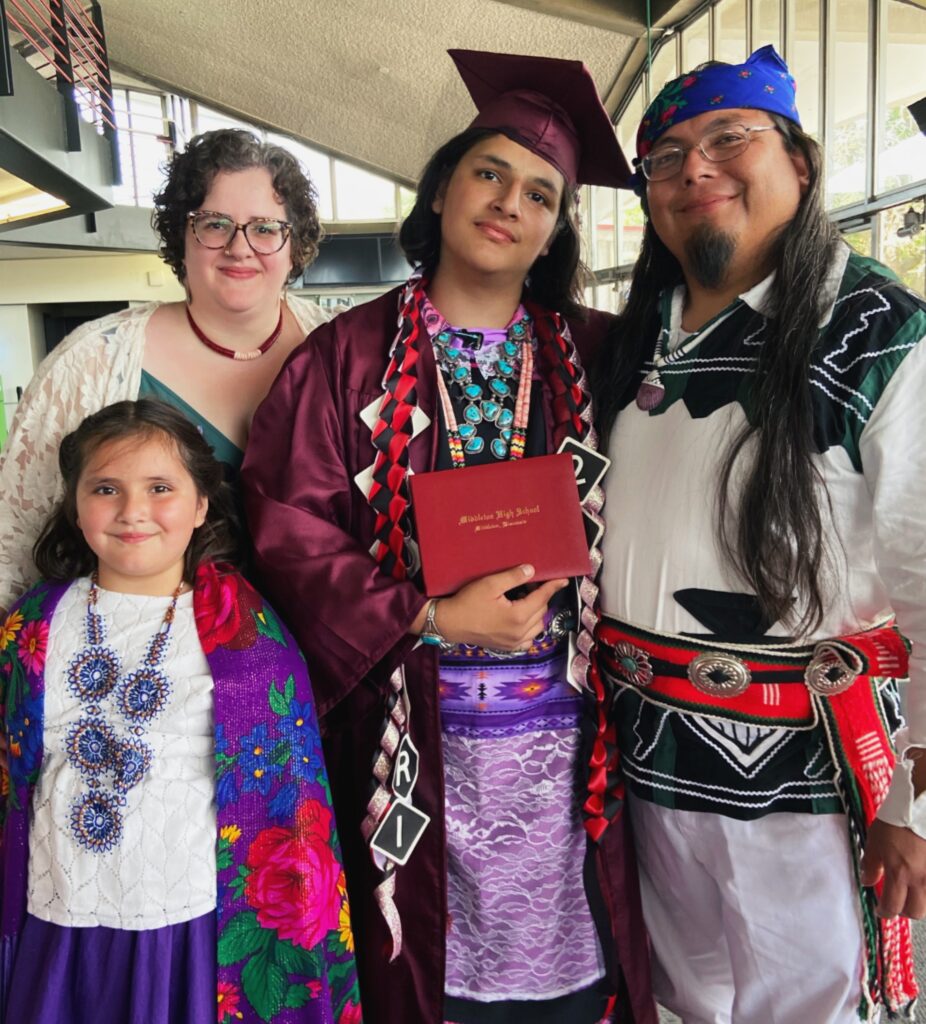“Gilda’s Club was the reason our family was whole through everything we went through,” shared Amandalynn in the Gilda’s Club Madison 10th anniversary video.
You may remember Alan and Amandalynn and their children Dmitri and Astraea. They were featured in our 10th anniversary video, sharing their moving story of navigating cancer with their young family. So much has happened since then–including a flood and a pandemic–we wanted to check in to see how things are going.

“Cancer was this speedbump”
Alan shares that he still thinks about his cancer journey every single day. He was diagnosed with advanced colorectal cancer at just 35 years old. He has a wife and two young children, and remembers, “I wasn’t scared for myself. I was more scared for my family.”
“Cancer was this speedbump that threw us all up in the air,” remembers Amandalynn.
As they worked through those early months facing a cancer diagnosis–facing grueling treatments and losing hair–they turned to Gilda’s Club and became a part of Family Night. There, they found support and others who “got it.”
Post-treatment, the path wasn’t always easy for their family. During treatment, Amandalynn remembers that they had a “clear pathway.” However, when Alan’s doctors declared that he had ‘no evidence of disease’, she said that pathway disappeared.
Focusing on mental health
After treatment concluded, Amandalynn was ready to put cancer in the rearview mirror…but Alan wasn’t there yet. “It was the first time we hadn’t been on the same page in 15 years,” Amandalynn shares. There was so much happening in their family at the same time–careers, kids, and keeping their household running. “It was hard to slow down long enough to process everything,” she explains.
Many people who have faced their cancer diagnosis can relate to this feeling. There might be “no sign of disease,” but that doesn’t mean that life suddenly returns to the pre-cancer “normal.” Cancer stays a part of your life long after treatment is finished.
For Alan, this was the start of a “focus on mental health which was key to my post-cancer recovery.” Mental health has always been a priority for him. However, before his cancer diagnosis, he had slipped into a deep depression. Cancer hit the pause button on the depression. It was the ultimate distraction. The depression came back after cancer treatment. It hit Alan hard. He spent the following 3 years post cancer treatment in intensive mental health therapy.
Helping others weather their storms
Five years later, their family is looking different. The biggest change is that Dmitri, just a middle-schooler during their time at Gilda’s Club, is now off to college at UW Milwaukee. The young adult is interested in studying meteorology and becoming a storm chaser. “Dmitri has always loved storms,” shares Amandalynn. “I’m really proud they picked something that has an impact.”
Alan has been sharing his story widely, including, recently, with Katie Couric (on “What I wish I knew about my cancer diagnosis”). He also works for Exact Sciences. Having gone through colorectal cancer helps him be more thoughtful and impactful as a Learning Technology Partner.
Alan has also been featured in a PSA for the American Indian Cancer Foundation, in partnership with the Colon Cancer Coalition. “Being Native American, there weren’t many stories of colon cancer in people my age,” he explains. In fact, sharing his story in the Native American community is particularly important to Alan. “In many Native American communities, this isn’t talked about. So it’s going out there and talking about it.”
Amandalynn explains, “Western medicine hasn’t always been kind to Native American communities,” so the skepticism is understandable. But Alan shares that he regularly hears from people that he’s spoken with that they’ve gotten a colonoscopy or other preventative screenings after he’s shared his story with them.
“They had an inherent understanding”
Amandalynn is still in regular contact with the people she met through her Gilda’s support group. It’s from that support group, she explains, that she, “learned a lot about how to show up for people when they’re having a hard time. The ways people showed up for us were incredibly generous. They had an inherent understanding.”
Alan and Amandalynn also support Gilda’s Club Madison philanthropically, so that other families touched by cancer can receive free support. Alan designates his gifts through United Way to Gilda’s Club (a United Way donor designated-only agency), and they’ve been a part of Gilda’s Run/Walk.
After having navigated an incredibly turbulent path together, their family is in a stronger and more mentally healthy place. Amandalynn shares, “I’m really grateful that Gilda’s gave us the space that we needed when we were first getting started. It gave us the recharge we needed to handle what came next. I don’t think we’d be in this place we are now without it.”
“Now having come through the other side of cancer, I’m really grateful for where we are as a family, as individuals, as a couple.”
